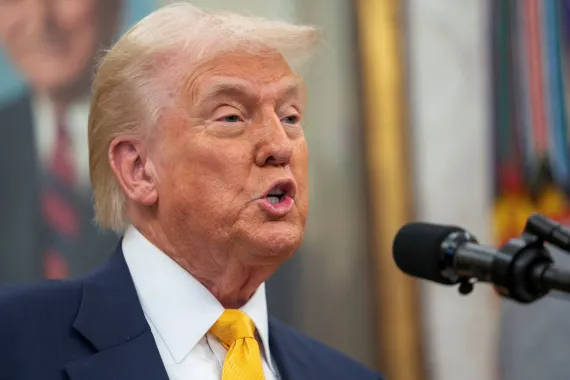US President Donald Trump has urged Americans to shift their attention away from Russian President Vladimir Putin and instead focus on issues within the country. In a post on Truth Social, Trump claimed that crime linked to migrants poses a greater threat to the United States than concerns about Russia. He stated that more attention should be given to “migrant rape gangs, drug lords, murderers, and people from mental institutions entering our Country—so that we don’t end up like Europe.”
Trump’s comments came shortly after a tense exchange with Ukrainian President Volodymyr Zelenskyy at the White House. The meeting, which many expected to strengthen U.S. support for Ukraine, ended without a final agreement on mineral rights sharing. Trump reportedly described Zelenskyy as “disrespectful” after their discussion failed to yield the expected outcome. This adds to the growing uncertainty about the U.S. position on Ukraine under Trump’s administration.
At the same time, UK Prime Minister Keir Starmer hosted a major diplomatic meeting at Lancaster House, where European leaders gathered to discuss the Ukraine crisis. Starmer, along with French President Emmanuel Macron and other European leaders, outlined a plan to help end the war. The meeting included representatives from Germany, Italy, Spain, and several NATO countries, emphasizing a united European effort in supporting Ukraine. Officials from the European Commission and the European Council were also in attendance, reflecting the significance of the discussions.
During the summit, leaders reportedly agreed on four key points related to Ukraine’s defense and economic stability. Starmer’s diplomatic efforts aimed to ensure continued European support for Ukraine while also encouraging the U.S. to maintain its involvement. His discussions with Macron and other leaders were focused on strengthening alliances and finding solutions to the ongoing conflict. The meeting was seen as a crucial step in coordinating European efforts, even as the U.S. position under Trump remains uncertain.
Trump’s stance on Ukraine has raised concerns among some European allies who fear a shift in U.S. policy. His criticism of foreign aid and focus on domestic security have sparked debates about how future U.S. policies will impact global stability. While some support his emphasis on border security and crime prevention, others worry that a reduced commitment to Ukraine could weaken Western alliances.
The ongoing discussions between world leaders highlight the complex nature of international relations and the challenges of balancing domestic priorities with global responsibilities. As tensions rise in both U.S. politics and international diplomacy, the future of American foreign policy remains uncertain. With key decisions ahead, the direction the U.S. takes could have lasting effects on both national security and global stability.

